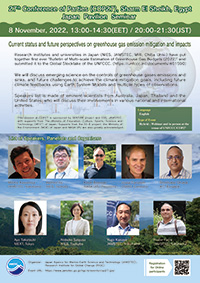
COP27 Japan Pavilion Seminar
Current status and future perspectives on greenhouse gas emission mitigation and impacts
- Date:
- 8 November, 2022
- Time:
- 13:00-14:30 EET (20:00-21:30 JST)
- Organizer:
- Japan Agency for Marine-Earth Science and Technology (JAMSTEC)
Research Institute for Global Change (RIGC)
Prabir Patra, Michio Kawamiya - Type of Event:
- Hybrid (Webinar and in person at the venue of UNFCCC/COP27)
- Language:
- English
Time schedule
Abstract of seminar:
The Ministry of Education, Culture, Sports, Science and Technology (MEXT) of Japan has launched a new program for Earth System Model development to support the IPCC Assessment Report cycle (SENTAN project).
Also, as proposed in COP26, research institutes and universities in Japan (NIES, JAMSTEC, MRI, Chiba Univ.) have put together first ever “Bulletin of Multi-scale Estimation of Greenhouse Gas Budgets (2022)” under the SII-8 project of the Ministry of the Environment, Japan (MOEJ) and submitted it to the Global Stocktake of the UNFCCC.
These activities and our independent research have addressed various issues on understanding the historical past budgets of greenhouse gases, separately for the anthropogenic and natural flux components. The observations using in situ and remote sensing techniques (surface stations, aircrafts, ships, satellites) have led to production of high resolution and high accuracy estimation of sources and sink of 3 major man-made greenhouse gases, i.e., carbon dioxide (CO2), methane (CH4) and nitrous oxide (N2O). However, future climate feedbacks on the carbon-nitrogen cycles of the terrestrial and marine environment are expected to play a much bigger role in the future, which remain largely uncertain in the most recent IPCC AR6.
At the COP27, we will discuss emerging science on the controls of greenhouse gases emissions and future challenges in order to achieve the climate mitigation goals, as laid out in the Global Methane Pledge (30% reduction by 2030) and more ambitious Nationally Determined Contributions towards net-zero emissions by 2050. The challenges are growing greater due to overall intensification of human activities and changing carbon sequestering efficiency of the natural ecosystems. Scopes for near-future prediction of GHG levels and climate change impact assessments using Earth System Models will be demonstrated. Our historical and future projection of sources and sinks data products will be delivered to the world community for use and evaluation with their country reporting to the UNFCCC. In addition to speakers from Japan, we invite speakers from foreign countries, who would talk about international activities and expectations from research in Japan.
